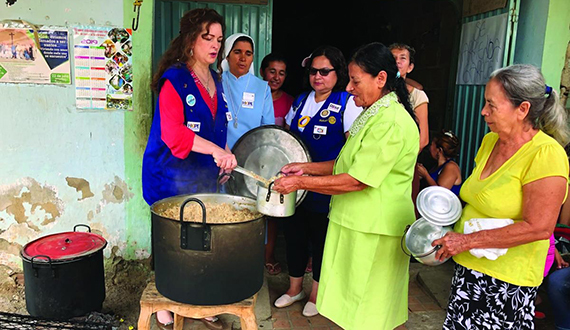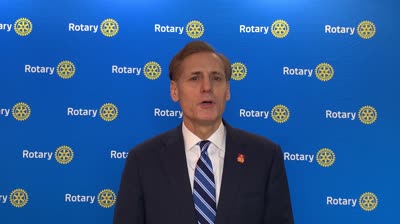
Cristal Montañéz has been working with Rise Against Hunger to provide meals for Venezuelan refugees in Colombia.
By Quentin Wodon, Rotary Club of Washington Global, USA
Refugees and Internally Displaced Persons (IDPs) are among the most vulnerable people on earth. The latest UNHCR report released ahead of World Refugee Day in June estimates that 79.5 million people were forcibly displaced in 2019. Sadly, the number keeps rising as conflict and economic crises force people out of their home. Syria still has the largest number of refugees globally, but displacement is also affecting millions of people in Venezuela and Central America, generating major economic and civilian challenges for the Latin America region as a whole.
On 23 June, with the help of Rotarians Rich Carson and Lara Bersano among others, the Rotary Club of Washington Global and the Organization of American States (OAS) organized an event to draw attention to the refugee crisis in Latin America. Speakers included Luis Almagro, Secretary General of the OAS, Claudia Blum de Barberi, Minister for Foreign Affairs of Colombia, Alexandra Hill, Minister of Foreign Affairs of El Savador, Diego Beltrand, Special Envoy for the International Organization of Migration, and John Hewko, General Secretary of Rotary International. In addition, a panel with representatives from the private sector and civil society featured Ingo Ploger, President of the Business Council of Latin America, and Cristal Montañéz, a Rotarian from Houston who implemented the Hope for Venezuelans Project in Colombia. Watch a recording of the event.
As a Rotarian, I was especially impressed by the work Cristal Montañéz is doing with Venezuelan refugees that have poured into Colombia over the last several years. With support from Rise Against Hunger, she has provided nearly 650,000 meals to refugees. This is just a start: she has recently received additional funding to continue her project.
Her story, as well as many other Rotary members who have led projects providing relief and creating opportunities for refugees globally, is captured in a report our club prepared ahead of the event with the OAS. The report, available on our website, shows in practical ways how Rotary members and other people of action can alleviate the suffering of refugees and invest in their future.
General Secretary John Hewko addresses the event in Spanish and English.
What are the next steps? One of the ideas following the event is to explore the feasibility of creating a Rotary Action Group (RAG) on refugees to help clubs and districts globally implement projects in support of refugees and IDPs. The number of refugees is expected to increase in the next few decades in part due to displacement caused by global warming. So there will be plenty of work to do.
Also, people with many different types of expertise can help refugees, since they need support in virtually all areas of their life, from education and employment to health and access to water and sanitation. We expect that many Rotary members may be both able and interested in providing support.
We have not decided whether to submit a proposal for a RAG to the Rotary International Board of Directors, for their approval. But if you are interested in the idea, please fill out a short survey or send an email to Quentin Wodon at rotarianeconomist@gmail.com. We plan to hold a zoom meeting on 11 July to brainstorm.
https://blog.rotary.org/2020/07/02/event-highlights-how-rotary-members-can-help-refugees/

